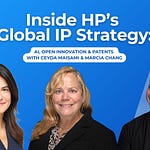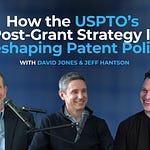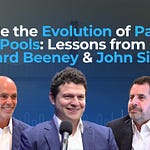USPTO During Last Administration - By the Numbers
Record backlog: The USPTO’s backlog reached a historic high of over 1.2 million pending patent applications, with average total pendency rising to 29.8 months – up from 23.8 months in 2019.
§101 rejections: The rate of §101 rejections rose by 10% from 2019 to 2024, with 24% of all Office Actions in 2024 containing a §101 rejection—approaching the 25% rate seen before the 2019 Revised Patent Subject Matter Eligibility Guidance was issued. The rise was most dramatic in art units examining patent applications. for AI inventions, where §101 rejections jumped from 38% in 2020 to nearly 80% in 2024. This trend also spread to other art units that deal with adjacent technologies.
PTAB institution rates rebounded to 68% and all-claims invalidation climbed to 70%. By 2024, only 15% of instituted proceedings resulted in all claims being found patentable.
USPTO’s Office of Public Engagement (OPE): 200 employees. OPE coordinated efforts of Council for Inclusive Innovation (CI2).
USPTO’s Office of Patent Legal Administration (OPLA): 37 employees. OPLA develops and implements all regulations and practices for patent examination. The 37 employees included non-attorney staff.
New Era at USPTO
When I first released an episode a week after inauguration about Coke Morgan Stewart taking the helm at the USPTO, I got some pushback that it was too early to predict what the new administration would do on patent policy—or what Coke could accomplish as acting director. However, it's now clear that, if anything, I underestimated how quickly the USPTO would move in a different direction under her leadership.
In under three months, she has refocused the USPTO on its core mission of patent and trademark examination, rolled back the agency’s approach to post-grant proceedings to where it stood at the end of the first Trump administration, and begun reshaping the USPTO’s DNA to ensure these changes outlast her tenure. Remarkably, while many parts of the administration have faced significant layoffs, the examining corps has largely remained intact—and the USPTO has even taken steps to expand it.
Whether you agree with the direction or not, it’s hard to deny that these are the most decisive actions we’ve seen from a USPTO leader to shift the U.S. patent system in a pro-patent direction.
That said, as anyone familiar with the Reddit r/patentexaminer thread knows, many USPTO examiners continue to feel uncertain about their roles and the resources available to meet the agency’s mission. Patent prosecution practitioners are increasingly hearing from examiners who say they have less time to resolve issues due to recent changes.
No one has chronicled these developments as closely as Julie Burke. With her previous experience at senior levels of the USPTO, Julie has become one of the few people able and willing to regularly shed light on what the agency is truly up to. Her reporting has turned her into a central figure for both insiders and outsiders who value her commitment to keeping the innovation community informed.
Drawing from his experiences as a practitioner, Clint Mehall has spent years studying and sharing insights on navigating the USPTO on behalf of applicants. We first connected years ago over our shared focus on understanding and working with the USPTO.
I’m fortunate that both Julie and Clint agreed to join me for the final episode of this season to discuss the whirlwind of changes at the USPTO over the past few months, what to expect in the future, and further steps the USPTO could take to better fulfill its mission. As you’ll hear, we disagreed on some issues but agreed that this story is far from over.
On this episode, we discussed:
Insights from the Reddit r/patentexaminer thread
Previous and current plans to reduce the record patent application backlog
Should the USPTO withdraw patent eligibility example 47 for AI?
Previous administration’s decision to end AFCP program and ideas for variation of AFCP program to help reduce the backlog
Misguided priorities and personnel decisions during last administration
Improving morale and performance of examiners
Adjusting credit system & improving culture to help examiners identify allowable subject matter
Choice of Valencia Martin Wallace as Acting Commissioner for Patents
USPTO’s decision to deprioritize examination of continuation patent applications
USPTO rescinding memorandum for discretionary denials at PTAB and Director taking over handling of the requests for discretionary denials
Aligning post-grant proceedings at PTAB with mission of USPTO
Suggestions about switching to a registration system for patents that does not require examination
And, much more!
Thank you, thank you, thank you!
This 21st episode marks the end of this season of Clause 8—which also happens to be the longest Clause 8 season I’ve ever released. We started the season on June 11, 2024, with a conversation with the legendary publisher of ip fray, Florian Mueller. Much of that episode focused on the European Union’s controversial SEP proposal and how innovators ended up on the defensive. On the second episode, Dana-Farber’s Chief IP Counsel Steve Caltrider talked about the potentially catastrophic impact of the Biden administration’s patent policy on innovation and development of life-saving treatments in the US.
At the time, it was hard to imagine that EU’s SEP proposal would be withdrawn on February 11, 2025 - exactly 8 months after that first episode aired - or that the USPTO would soon start heading in such a different direction so soon. The USPTO’s dramatic shift is the focus of this final episode.
In between, we’ve kept conversations going with some of the most fascinating people in IP - like legend Erich Spangenberg (who’s once again making waves with major patent acquisitions), Federal Circuit Judge Timothy Dyk, Avanci Vehicle President Laurie Fitzgerald, Walmart’s Chief IP Counsel Sri Alturi, and Kathy Duda, head of USPTO’s POPA labor union.
This season also marked a few special releases:
Two video interviews1 (with Qualcomm General Counsel Ann Chaplin and Tradespace CEO Alec Sorenson)
Our first debate (on patent eligibility, featuring Clause 8 favorites Andrei Iancu and David Jones)
Our first panel discussion (on valuing patents)
And a couple more solo episodes - including reflections on sophisticated chief patent counsel focusing on obtaining valuable patents and Coke Morgan Stewart’s selection to lead the USPTO).
None of this would have been possible without your support. So, THANK YOU to:
All the incredible guests, from Israel to Brazil, who shared their stories and views so candidly - and to the folks behind the scenes who helped make the recordings possible
Our amazing producer Carol Wu, who helped me get my start in podcasting and I was fortunate to have join me to put out this season…while dealing with my endless ideas
Tradespace for enthusiastically backing the podcast and the Clause 8 community
And most importantly, YOU - the listeners. The podcast only exists because enough of you care about IP to listen in your free time. I’m beyond grateful for that. And an extra thank you to everyone who helped share Clause 8 with others. Because of you, we’re still growing—and excited to bring you more in future seasons.












